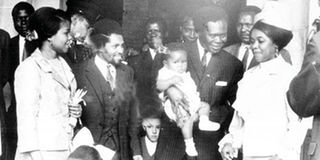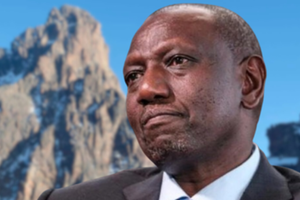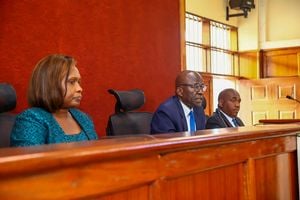Amin sends Obote packing

PHOTO | FILE Ugandan leader Milton Obote and his wife Miriam in Nairobi in 1968 with the family of Kenyan Chief Justice Kitili Mwendwa. Obote was toppled three years later.
What you need to know:
- British secret documents declassified in 2002 suggest that Britain welcomed Amin’s coup, but was surprised that the Israelis also backed it
- Nyerere, the pioneer of socialism in the region, was worried about the coup
Ugandan President Milton Obote was toppled in a coup by his army commander, Idi Amin, setting in motion a chain of events that eventually led to the collapse of the East African Community.
Obote was overthrown while attending a Commonwealth meeting in Singapore. Surprisingly, the coup received popular support, not only in Uganda because of Obote’s increasingly repressive ways, but also in London and Tel Aviv.
While Britain was getting increasingly uncomfortable with Obote’s economic policies that were hurting its interests, Israel wanted a person who could help them keep tabs on Sudan, then a key link to the Arab world.
British secret documents declassified in 2002 suggest that Britain welcomed Amin’s coup, but was surprised that the Israelis also backed it.
UK Prime Minister Edward Heath reportedly told leaders at the Singapore summit that some of those attending would not be able to go back home.
The declassified British papers explained that Amin was central to Israel’s operations in the 1960s, supplying arms to the Anya-Nya rebels in southern Sudan (now South Sudan). Israel’s objective was to ensure that the rebels kept the pro-Arab north in check. Obote had not been keen on the scheme.
The coup came as he started to implement his Common Man’s Charter, the economic blueprint that leaned towards socialism, and sought to nationalise about 80 British companies in Uganda.
COUP REJECTED
Tanzania and Kenya, then partner states with Uganda, reacted to the coup according to their national interests. Julius Nyerere rejected the coup outright and later declared that he would not attend the same EAC meeting as Amin.
The pioneer of socialism in the region was worried about the coup, given that the same pro-CIA and MI6 agents overthrew his friend, Dr Kwame Nkrumah, of Ghana, whom he admired greatly. He knew he could be next.
Nyerere was the first regional leader Obote contacted while in Singapore. The two met in New Delhi as the Tanzanian leader made a state visit to India. Nyerere advised Obote to cool his heels in Nairobi until he returned.
Jomo Kenyatta initially gave refuge to Obote soon after his arrival from Singapore. Obote was a close friend of the Kitili Mwendwa family. He narrates in his biography that they were accommodated at Panafric Hotel in Nairobi, from where he made calls to Kampala to find out from his loyalists whether the coup could be reversed.
He says in his book: “The result I got was that it could. We had mobilised six vehicles to drive to Tororo when all of a sudden, Kenya authorities stopped anybody from leaving my hotel. Nobody left the hotel, our telephones were cut off. I decided to go to Tanzania quietly.”
Some historians believe that Kenyatta could have been pressured by the British not to give assistance to Obote in a way that could help him return to power.




